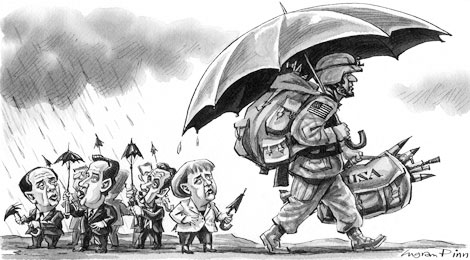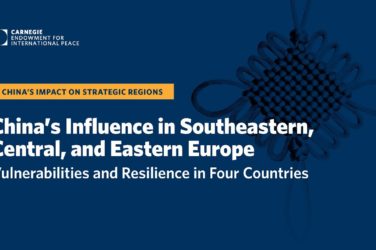TOUGH LOVE, REALPOLITIK AND MANAGING FOREIGN AFFAIRS IN MESSY TIMES
“What’s lerv got to do with it?” Tina Turner
“The enemy of my enemy is my friend (unless he’s also my enemy…)” Machiavelli (Genetically modified)
“If I were you, I wouldn’t start from here” Old Irish saying
CONTEXT
THE TABOOS TO BE BROKEN, OR CASTING ASIDE THE CASTA
TOUGHNESS IS BACK IN VOGUE
TOUGH LOVE IN PRACTICE
CONTEXT
- The first two decades of this century have registered close to a 9 on the Richter scale of political transformations: border changes, regime changes, the continuing rise of violent non-State actors. You name it, it’s happened.
- At the core of everything has been this century’s variant of Oswald Spengler’s The Decline of the West.” And nowhere has this been more visible than in that same West Spengler was referring to, namely Europe. Whereas the US, by its geography, is always looking at several compass points at the same time, Europe remains inexorably Atlantic-bound.
- Europe thought that because its astonishingly bellicose Western (France) and Central (Germany) States decided to bury their mutual hatchets it could spread this “new message” of (non- religious) peace and human rights to all and sundry. Indeed, while being exceptionally dependent on the US in the more than seven decades since the official end of hostilities of World War II, it has often given the impression of preaching to the US as well.
- Within the US, the “softly softly” line, though always strongly challenged by a variety of groups, has played a significant part in shaping thinking and policies. In part this occurred because several sets of geopolitical alliances and support positions have been deemed to be sacrosanct – Israel, Saudi Arabia, NATO, Japan are among those regularly well regarded, despite some of them being highly contentious. In part it occurred because Joseph Nye’s notion of “soft power,” or the geopolitics of suasion, manipulation of carrots and sticks, and the rest, can and does on occasion turn out to be useful. And in part it occurred because the US, as the pre-eminently democratic nation – and still more importantly, the nation where the concept of freedom is at the heart of everything – believed it had to diminish its image of being tough guy, and play geopolitics by other means. (to out-French the French?)
- On these shaky foundations a whole array of nebulous notions and insufficient institutions, ranging from “the international community” (which in practice means those countries whose ruling groups at least pay lip service to the mantra offered by the US and Europe), through “G’s” of various numbers (7, 8, 20, the number you first thought of), to bodies that reinvent themselves with commendable suppleness and engage in fresh missions before modifying existing mission statements (the IMF, NATO), have been erected and used.
- This approach has in fact a great deal to commend it. In its essence it is realistic. Why? Because it implicitly recognizes that life, above all political and geopolitical life, is principally a matter of “getting by without too much damage..” Searching for utopias, or taking positions that purport to contain universal truths, is for hopeless idealists or religious zealots. While the former might be more pleasant company, neither is a good guide for the business of living. Nowhere is this stated better than in the homeland of Machiavelli, Italy. Anyone there will tell you that all the fuss about surfing and the internet has nothing modern to it; in Italy, surfing has been a way of life since the Etruscans.
- The problem for “the West” is that what started (given the dreadful self-inflicted condition Europe was in by 1945) as a pragmatic approach was gradually transformed into a dogma, into a distorted myopia for viewing what was happening at home and abroad. Now chronic blindness has set in, compounded by fear of change.
- So 2016 presents, in the starkest form, a crossroads, a dilemma, an existential challenge, call it what you will. Within every region of the world, it is manifestly the case that “business as usual” is a thing of the past. The problem is, what kinds of business, under what rules (if any), are the things of the future? Who, if anyone, will manage those? And what will be the objectives, if any, that the managers are supposed to achieve?
- Just as the past few decades have seen sweeping transformations in the concepts and practice of “love relationships” at the personal level, so politics and geopolitics are undergoing seismic shifts. Relationships perforce there will be – but few seem to have much idea of their possible nature.
- The purpose of this essay is to delve into what has been going on, within and across countries, and try to sort out an architecture of thought, language and action that might be more appropriate to actual and emerging situations than what has been customary for a long while now. Whatever is said is, of course, open to high risk of being irrelevant extremely quickly. But it should be possible to trace out some contours that are likely to prove more useful than the prevailing ones.
THE TABOOS TO BE BROKEN, OR CASTING ASIDE THE CASTA
- Though many and diverse routes have been chosen, the Western countries have developed over several decades their ways of managing things – and each country in the West has generated a set of people who have made professions out of doing that: managing.
- With deliberate simplification, these routes can be characterized as follows.
- First, parliamentary deliberations of some kind should be the norm (with big variations in the power of parliaments as against other kinds of decision makers and law makers)
- Second, some separation of powers across legislative, executive and administrative branches
- Third, in most places, restrictions (implicit or explicit) on what can be promoted as a political ideology (for instance, prohibition of overtly Nazi parties, prohibition of public utterances of racist doctrines, promotion of politically correct speech).
- Fourth, a fair degree of media freedom (again, with significant differences across countries)
- Fifth, no military led governments
- Sixth, the clear possibility that there can be regular changes, via the ballot box, in the political parties that make up the governments
- Seventh, the idea that outright war should be a last resort for defending a country’s interests
- Eighth, the use of the United Nations as a device for “legalizing” armed interventions on the numerous occasions when they do occur
- Ninth, sanctions of all sorts, and of highly variable degrees of effectiveness, against governments held to be flouting these rules
- Tenth, a tendency to change friends only slowly and reluctantly.
These “10 Commandments,” like the original set, have of course been more honored in the breach than in the observance. On several occasions, and very regularly in the EU, they have been supplemented by all sorts of other “rules,,” which again have been applied in highly discriminatory fashion.
At the back of everything that has gone on, there has been an unexpressed notion among the management groups that they can recognize their own kind and that those who do not belong shall always be treated with suspicion (or worse). In other words, the debates during the last number of years over “political correctness” have really missed the point. A far more serious kind of “correctness” has mostly remained unspoken, and it concerns those who are “acceptable” to the existing casta. The Italian/Spanish word is now common vocabulary on the European continent. In the Anglo-Saxon world, the terms are “Washington” and “The Establishment,” in Russia the post- communist ruling group is still a “nomenklatura.”
The casta are now being challenged by groups of all kinds in a very wide range of countries. In the US, the rise of Donald Trump is seen with the greatest alarm by the establishment of the party whose nomination as presidential candidate he is seeking. Indeed, to justify their anti-Trump positions, a number of Republicans are in fact trying to paint him as a Democrat (in the past he did appear to be closer to that labelling). The positions he is voicing are rebuked as being totally out of order in a democracy. The fact that his main rival for the Republican nomination, Ted Cruz, has positions which are in many respects divorced from the Republican establishment, and that he, too, has made offending people (especially other senators) something of a specialty, appears to have gone largely unremarked.
Much the same charges are levelled against the “Front National” in France, the AFD in Germany, UKIP in the UK, and a host of other parties in other countries. The fact that the existing casta feel their positions to be gravely threatened by these groups has led to them all being tarred with the same brush, which is a serious error. For instance, on the issue of racism UKIP has a singular position – it is seeking to control the immigration of Caucasians of the central and eastern European variety, which is certainly a novel approach. Furthermore, there is a big difference between Trump, who has never held elected office, and the leaders (plus many others) of the European “populist” groups who have themselves been paid professional politicians for many years, occupying in many cases seats in the European Parliament, part of an entity they want to leave.
The clashes within countries have been provoked, at least in part, by events stemming from other countries. Immigration is the battle cry for all who harangue the behavior of the casta. Of course it is not a new phenomenon – in fact, in the US it is inextricably linked with the American Dream. Probably 99 percent of the US population today are descended from immigrants, whether or not their forefathers arrived on the continent by choice (the case for the very large majority) or by force (the slaves from Africa and indentured servants from Europe) Even the descendants of Native Americans migrated originally from Asia. The US has rightly made a point of saying to others “Give me your tired, your poor, your huddled masses yearning to breathe free,” along with people suffering in many other ways. But the European experience has been very different. The French Revolution emphasized the political persecution angle, and France has rightly prided itself on offering succor to many people, including those from other European countries. More than a century after the French Revolution, the geo-political earthquake that was the 1914/1918 War and its aftermath led to enormous population movements on and out of the European continent. Fridtjof Nansen formed what is now the United Nations High Commission for Refugees at that time to cope initially with the European problem of Stateless people. Driven by very different considerations, Stalin and Hitler, aided by a number of other political leaders from Central European countries, took far less pleasant routes for “managing” migration. In other words, until the 1939/1945 conflict, politics called the migration tune in Europe.
Yet the vast majority of people who moved into Western European countries (principally France, Germany–particularly the old Federal Republic –, UK, Holland, Belgium, Switzerland) after 1945 did not shift because of political motives; they migrated for economic reasons. For decades the countries just mentioned were content with this situation and felt they could control it. The economic boom required labor, and the west Europeans could not get enough of it. But since the long decline set in – with hindsight, the economic braking process started close to 40 years ago – the labor need waned considerably while domestic unemployment became more difficult to manage. Europe, especially (though not solely) the EU countries, is now confronted with the highly uncomfortable realization that the fine-sounding declarations of solidarity and succor can be implemented only at a substantial economic cost, a cost that the vast majority of those countries are not prepared to meet. (Imagine that we now have Norway sending back Afghans, and arguing with UNHCR that the money Norway gave it to do the job is being badly or even illegally spent). Preaching has a price. While figures such as Jesus, Gandhi and many others were ready to pay the ultimate price, the infinitely lesser beings occupying political posts today are mostly unwilling to even the smallest price, their jobs.
TOUGHNESS IS BACK IN VOGUE
- What do you do when the price of maintaining existing arrangements is perceived as becoming too high? There are several options – but continuing with the status quo is not one of them
- First, you can try persuading others in the arrangement to contribute to the costs. This is not simply what Donald Trump is talking about with NATO. It has in fact been happening throughout the present century in meeting issues in Iraq, Afghanistan, Libya, Syria and various other cases. Burden sharing is a reality, even if the practice seems to go on in a case by case fashion (coalitions of the willing), and even if the distribution of costs remains highly skewed. Mr. Trump is suggesting that the reality be recognized as such, and that those who are benefitting from the US umbrella take a reasonable turn in holding up the umbrella when the rains are heavy.
- Second, if the arrangements are bilateral in nature, as in the US/Egypt and US/Israel dealings, you make it crystal clear to the other parties that there is in fact an arrangement that both parties initially agreed to respect, but which one party is consistently breaching. Thus, Egypt has undertaken to pursue its internal politics in a certain way, but it not doing this. The present government is replicating, after its own fashion, what the series of modern Pharaohs, from Nasser to Mubarak (and currently El-Sissi) has always done, namely repress severely several (or all) elements of opposition. Israel has gone down a route which has led to Prime Minister Benjamin Netanyahu excoriating the US for seeking significant improvement in its relations with Iran, castigating EU countries for sanctioning trade in products from the Gaza Strip illegally occupied by Israel, and engaging in sundry other maneuvers that show scant regard for the constant military, scientific and other collaboration/support that the US gives to Israel.
- Third, if the arrangements cannot be put on a new footing, which is mutually acceptable and is adhered to, then you end the arrangements. To end an arrangement does not in any way suppose that erstwhile friends will henceforth be antagonists (plenty of divorces, including my own, are a prelude to a lifetime friendship conducted under different conditions). Both parties move to a fresh situation in which expectations of mutual support are no longer solid, and where both parties have degrees of freedom to act which they did not possess before.
- Fourth, ending arrangements is not, however, a step (or series of steps, if a number of agreements are altered at more or less the same period), that should be taken without a serious reflection on the overall perception a country has of its role in geopolitics, or its ways of viewing the world. It is here that the interaction between internal politics (the crisis of the casta) and international affairs starts to bite.
The political class of any significant country, one where the management of foreign policy has significant financial costs, where foreign policy can have appreciable impacts on trade and business, and where the negotiation of agreements/conventions/treaties of all sorts is an integral part of the country’s interactions with others, has to adopt a position on foreign relations that is congruent with its behavior at home. It is no accident, then, that individuals, political parties, and movements (that may or may not be well organized, and that may or may not endure over lengthy periods of time) today criticize bitterly the casta for their behavior in home affairs and in foreign affairs.
What we now seem to have, pretty much everywhere in US and Europe, are political situations characterized by an incredible, and toxic, mix of views in which the notion that “our country must become itself again” coexists with the desire to obtain the most from an open global economy. The casta are seen as those who have profited from the global dimension but have paid scant attention to their own people. Put simply, those who are allegedly a country’s representatives are in fact precisely those who have least regard for their country. The cast of the Panama Papers could all happily stay there and the inhabitants of the countries they allegedly represent would all be better off. The “new actors” (Trump, Marianne Le Pen, Petry, Farage and many others) project themselves as the true defenders of their countries, a role usurped by the casta.
TOUGH LOVE IN PRACTICE
- The objective of tough love is to alter whole areas of a country’s existing foreign arrangements (bilateral, regional, international) so that the country is better off (measured usually in straight financial terms, though with further benefits, for example keeping military away from unnecessary risks)
- The method for achieving these changes to foreign commitments and obligations is to negotiate the alterations through adopting much more rigorous positions than have normally been taken. The use of physical force is not, generally speaking, part of the method.
- Tough love is intended to make foreign partners understand that they cannot feel free to do whatever they want, confident that the country will not act. Instead, there is a kind of decent behavior conditionality, which is always present. The age of blank checks, one-sided commitments is over.
- The implication of tough love is that “friendships” or alliances are not set in stone – and neither are antagonistic relationships. The notion that sets of countries share values is not thereby destroyed, but it is no longer a rock solid basis for a country’s web of foreign linkages.
- Both the US and EU countries have neglected the pragmatism and agility which tough love requires. Ever since the fall of the Berlin Wall and the disintegration of the Soviet Union, these countries have continued to behave with foreign policy mindsets that seem to overlook, in quite Olympic fashion, the massive upheavals which have taken place. Since one of the upheavals has been economic and financial in nature, and has put exceptional pressure on the actual and future wealth prospects of large swathes of domestic populations, the chasm between the behavior of politicians and the realities facing most electors has widened enormously.
- The casta has demonstrated that, while it would have been desirable to effect change carefully, it is incapable of doing that. Reform from within is not possible. Hence casta strategy everywhere is now a peculiar mix of declaring that popular movements (such as the Tea Party in the United States, etc., or the Trump and Bernie Sanders campaigns) are illegitimate, constitute a mortal threat to “our values” (whose?), appeal only to the ignorant and uneducated masses, threaten our international relations, require the closing of ranks (as in the French regional elections where the different casta groups in most places opted to field a single candidate to defeat the leading Front National), or maybe can be incorporated within us (the Lampedusa strategy, or in the United States the “Big Tent” idea of political parties).
- Since the casta, while distinct at national levels, share common interests in many cross-border matters, their aim is to ensure that the international superstructure is not overturned by tough love. What is and is not allowable can be illustrated by a simple play on words. Daesh is obviously out. But the austerity program driven through the Eurozone by Dijselbloem (the Dutch Finance Minister, head of the EU Finance Ministers group) and Schaueble, the German Finance Minister), a program labelled “Dijsch,” is absolutely in.
- Tough love thus marks a type of realpolitik. When that term was in vogue, starting with Metternich after the Vienna Congress, and running through to Kissinger some 40 years back, it mostly referred to foreign affairs alone – little consideration was given to the internal political situation of the countries practicing realpolitik. Where today’s tough love differs is that it will obtain support from large swathes of the domestic populations since they perceive a new muscularity in foreign dealings as helpful to their own economic situations
- There will, of course, be plenty of clashes as tough love is implemented, not least between countries that thought they were close allies. The ongoing negotiations related to the Transnational Trade and Investment Partnership (TTIP) are an excellent case in point. The casta on both sides of the Atlantic are in favor, in part because they are distinctly uneasy with the future trade and investment panorama in a world where the Pacific matters far more than the Atlantic. In this transnational companies support them. Yet numerous categories of domestic populations, from industrial workers to small-scale businesses, to consumer groups, are deeply uneasy about the implications of this “deal among friends.” The fact that opacity of information has been the hallmark of the discussions, with even parliamentarians on both sides of the pond forbidden (until earlier this year) from access to the key documents, has of course contributed to the sense of exclusion
- Perhaps “the sense of exclusion” is the key phrase. In the past most people in Western countries : (a) had a sense of being affected by foreign affairs only when called upon to fight; (b) were generally living with improving economic prospects and not too concerned about the international superstructure; (c) trusted the political and administrative groups to be honest and act largely in the country’s interests.
- In today’s world, those conditions have manifestly disappeared. Leaks of all types, sea changes in every region of the world, the financial crises, the conspicuous contempt of the casta for everybody else, all these have made crucial contributions to the seismic shifts in the political landscape. Politicians cannot continue to engage in the minutiae of the ballot box. Either they get tough, or others will toughen them up.





